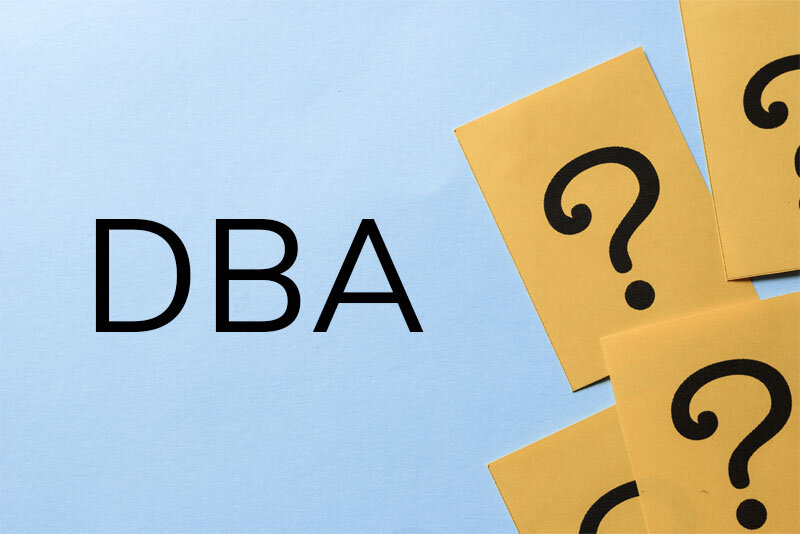A DBA – or Doing Business As is a name different from a company’s legal name. It is also referred to as a trade name, assumed business name, or a fictitious business name. Typically, businesses use a DBA name when they want to market their products or services under a company name that’s more memorable or distinctive than their entity’s legal name.
DBA laws requiring companies to register fictitious names are consumer protection regulations that provide transparency. They let the public know who is operating a business. DBA filings put information about the person or company who owns a fictitious name on the public record. It helps safeguard against untrustworthy business owners who may try to hide their identities and take advantage of consumers.
Is a DBA a Legal Entity?
A legal business entity is any company or organization that has filed formation documents – e.g., Articles of Incorporation or Articles of Organization with the state. Examples of legal business entities include C Corporations, Nonprofit Corporations, Limited Liability Companies – LLCs, S Corporations, and other state-registered entities. The business name used on the forms when creating an entity is its legal name, which automatically becomes registered with the state.
A trade name is not a legal entity, and conducting business under a DBA name does not form a business entity. Moreover, a fictitious name may not use any terms – such as Inc., LLC, and Corporation, etc. that imply it is the company’s registered legal name or words that indicate the business or its owners have specific accreditations or certifications – unless they indeed have achieved those credentials.
Each state has restrictions on the specific words restricted or prohibited in business names. Several examples of commonly restricted words include foundation, bank, university, school, doctor, trust, cooperative, museum, apothecary, council, conservatory, attorney, and loan.
Why Would I Want to Use a DBA?
The reasons vary. Some business owners file for DBAs as part of their marketing strategy to expand their core business offerings or enter entirely new lines of business.
- It gives business owners branding flexibility that can help them reach new markets and attract their specific target audience.
- Some banks might require that a business name be different from its owner’s name on a business bank account.
- If a business’s legal name isn’t available as a website domain name, finding a DBA that is available as a domain name can resolve the issue without changing the company’s legal name.
- Filing for a DBA allows an LLC or Corporation to run and market additional business lines under different names without going through the time-consuming process and expense of forming additional business entities.
- It provides some privacy for sole proprietors and general partners who don’t want to use their personal names when marketing their business products and services.
- A DBA can be useful for business owners who operate as franchisees. For instance, if Anna Vasquez opens a McDonald’s franchise location, She might set up an LLC under the legal name “Vasquez Enterprises, LLC” and then file a DBA for “McDonald’s” – or some other name per the franchise agreement.
- It may be used on contracts and bank accounts, allowing business opportunities and financial activity to be managed separately from the core business.
How Do I Know If I Need a DBA?
Any time someone wants to use a business name or brand name that isn’t the legal one registered for their company, they must either create a new entity for the name or file for a DBA. The latter is a less costly and complex process.
In the case of a Sole Proprietorship or Partnership, which is considered the same legal entity as the business owner or partners because it does not file formation paperwork with the state, a sole proprietor’s personal name – or partners’ names is considered the company’s legal name. A Sole Proprietorship or Partnership may market its services using a name that contains their owner’s name.
For example, Lorraine McBride Wedding Consulting Services or Vasquez, Jones, and Lewis Roofing. However, they wish to use any other name, such as Blissful Beginnings Wedding Consulting or Top-Notch Trio Roofing, they must file for approval to use a fictitious name.
Similarly, an LLC or Corporation must file a DBA if its owners want to avoid forming an entirely new entity but wish to use a name other than the one they registered on their entity formation documents.
For instance, if Right On Automotive Repair, LLC wants to expand its offerings and market those new services under the name Right On Roadside Axle Repair, its owners must file a DBA—unless they want to form a new entity for the axle repair business.
When a C Corporation or LLC is formed, the registered legal name automatically becomes protected within the state. No other LLC or Corporation in the same line of business may legally use that company’s name. However, a business using the name as a DBA in the state has the legal right to do so—since it is not the legal name of the company. Also, registered entities in other states may use the name, unless it is protected by a trademark.
How to Register a DBA
The process, filing fees, and paperwork for setting up a DBA can vary depending on where the company conducts business, its legal structure, and the type of business it operates. Before submitting the form and fee, it’s wise to check if the name is available. A company’s request to use a fictitious name might be denied if another business – particularly one in a similar industry in the state uses a similar name.
After a fictitious name application has been approved, the business receives a certificate documenting its legal right to use the name. Seven states—Arizona, California, Florida, Georgia, Illinois, Minnesota, Nebraska, Nevada, and Pennsylvania—require a business to publish its fictitious business name in an approved newspaper or recognized legal publication once the DBA is approved.
In many states, DBAs must be registered at the state level, but some are handled at the county or city level instead. Which agency handles the filing may also depend on the type of entity.
The following states require county-level filing instead of or in addition to state-level filing:
- Arkansas
- California
- Delaware
- Georgia
- Kansas
- Nevada
- North Carolina
- South Carolina
When the DBA owner is an individual, but at the state level the DBA owner is another business entity, the following states require county-level filing instead of or in addition to state-level filing:
- Illinois
- Indiana
- Kentucky
- Maine
- Michigan
- New Jersey
- New York
- Ohio
- Oklahoma
- Rhode Island
- Tennessee
- Texas
Massachusetts is the only state that requires city-level filing in place of or in addition to county-level and/or state-level filing
States that don’t require DBA filings include:
- Alabama
- Alaska
- Arizona
- Delaware
- Florida
- Hawaii
- Kansas
- Maryland
- Mississippi
- Nebraska
- Ohio
- Wisconsin
- Wyoming
CorpNet Is Here to Help!
Let us file your DBA for you. Our filing experts know exactly what’s required in all 50 states and will make the process nearly effortless for you.
FAQs
When should you file for a DBA?
Filing for a DBA should occur before conducting business under the fictitious name. If a company uses the name before the DBA is officially registered, its owners could face legal issues.
Do you need a Tax ID Number for a DBA?
A DBA is not a separate tax-paying entity, so it does not need its own tax ID number. Instead, income associated with the DBA gets reported in the same tax return as other business income – e.g., Schedule C of Form 1040 or Form 1120.
Can an LLC or a Corporation Own a DBA?
Essentially, yes. An LLC or Corporation obtains a DBA by filing paperwork to register it under its legal entity name.
Example: If the owners of a Corporation with the legal name Atlantic Hardware, Inc., want to use the fictitious name Superior Home Repairs, they would file a fictitious name application to register the DBA name to Atlantic Hardware, Inc.
How many DBAs can a business have?
There are no limits to the number of DBAs a business can have. Some companies use multiple DBAs to start different brands under the same legal structure.
Is a DBA or LLC better?
It depends on what a business owner intends to accomplish. An LLC is more than just a trade name; it is its own business entity that is legally separate from its owners. So if an entrepreneur wishes to protect their personal assets, an LLC can achieve that but a DBA cannot. A DBA is a fictitious name that a company has received permission to use instead of its legally registered business name. It allows a company to market its products and services under the assumed name, but it does not provide any sort of liability protection for the business or its owners.
Can you turn a DBA into a Corporation or LLC?
If a DBA name is not already the legal name of another business entity, a business owner may likely use the fictitious name as the name of their new LLC or Corporation. Depending on the state’s rules, this might involve filing a request to withdraw the name as a DBA before forming a Corporation or LLC with the name registered as the entity’s legal business name. Other steps are also involved in the process of creating a business entity, and it’s wise to discuss the requirements with an attorney and accountant.
Are fictitious names protected?
Two states, Alaska and North Dakota, offer exclusive use rights to businesses when they register a DBA. In others, fictitious names aren’t necessarily protected, but they may deter other companies from using the same or similar name, which could confuse the public—and some states might deny a company’s DBA filing if the fictitious name requested is too close to one already in use. One way to protect a DBA name nationally is to register it as a trademark with the United States Patent and Trademark Office – USPTO.
In every state, when a C Corporation or LLC is formed, the registered legal name automatically becomes protected within the state—i.e., no other LLC or Corporation in the same line of business may legally use that company’s name. However, another business in the state may use an LLC’s or Corporation’s legal name as a DBA and registered entities in other states may use the name, unless it is protected by a trademark.
Can a DBA have its own checking account?
After registering a fictitious name with the proper government agency, most banks will allow a business to open a bank account for the DBA so the company can receive income and make payments in the DBA name. A bank account for a DBA will typically be set up in the name of the legal entity with the DBA name behind it—for example: “Mary Jones Consulting, LLC d/b/a Ultimate Success Catalysts.”
Are there any downsides to a DBA?
There are a few drawbacks to consider. Namely, filing a DBA doesn’t guarantee a business will have exclusive rights to the name. Also, a DBA does not provide any personal liability protection for the business owner because it is not a legal entity – However, if an LLC or Corporation files a DBA, the LLC or Corporation owners are protected under their business entity for any liabilities of the company’s DBA.





